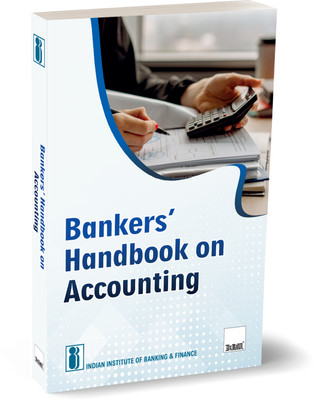IIBF X Taxmann's Bankers' Handbook on Accounting ŌĆō Essential resource for professionals focusing on the multifaceted and dynamic nature of banking accounting from fundamentals to advanced practices(Paperback, Indian Institute of Banking, Finance)
Quick Overview
Product Price Comparison
This comprehensive guide is essential for understanding the multifaceted and dynamic nature of banking accounting. It meticulously covers every aspect of the field, from foundational principles to advanced accounting standards. It provides a deep understanding of the processes and practices pivotal in shaping financial reporting in the banking sector. It underscores the interlinkage and importance of an organisation's robust accounting and auditing systems. It serves as an essential resource for understanding the intricacies of banking accounting, covering the following: (I) Fundamental Principles of Accounting (II) Financial Statements of Banks (III) Preparation of Financial Statements of Banks & Taxation (IV) Accounting Standards (Ind AS) The current edition has also been updated based on banking experts and internal faculty feedback, focusing on practicality and current digital trends. It is an invaluable resource for students, professionals, and anyone interested in banking accounting. It is structured to cater to both beginners and seasoned practitioners The Present Publication is the 2024 Edition, updated by Ms Anita Toshniwal | Chartered Accountant. Taxmann exclusively publishes this book for the Indian Institute of Banking and Finance with the following coverage: (I) Module A ŌĆō Fundamentals of Accounting (1) Accounting | An Introduction ŌĆō Explore the nature, purpose, and historical perspectives of Financial, Cost, and Management Accounting. Understand the origins and evolution of Accounting Principles (2) Accounting Process ŌĆō Understand the Accounting Process, comparing Manual and Computerized Accounting Systems. Analyse the differences and implications of manual versus computerised accounting (3) Key Definitions and Terms ŌĆō Gain a foundational understanding of crucial accounting terms and definitions (4) Journal Use and Voucher Importance in Banking Transactions ŌĆō Learn about using journals and the role of various vouchers in bank accounting systems. Examine the accounting systems of different banks (5) Bank Reconciliation Statement ŌĆō Introduction to the concept and importance of Bank Reconciliation Statements (BRS). Discuss the reasons for discrepancies between Cash Book and Pass Book and the preparation and advantages of BRS (6) Depreciation Accounting ŌĆō Understand the meaning, causes, and need for depreciation. Study various depreciation methods, including Straight Line and Written Down Value, and their advantages and disadvantages. Learn about the amortisation of intangible assets and fixed asset replacement (II) Module B ŌĆō Financial Statements of Banks (1) Introduction to Bank Financial Statements ŌĆō Overview of banking business and associated restrictions. Detailed look at the bank's book-keeping systems (2) Advances and Asset Classification ŌĆō Presentation and policy disclosures regarding advances. Deep dive into income recognition and asset classification (3) Bank Cash, Balances, and Short-Term Assets ŌĆō Analysis of cash, RBI balances, and short-notice assets. (4) Fixed and Other Assets ŌĆō Detailed examination of fixed and other asset presentations and policies (5) Borrowings, Deposits, and Capital Accounts ŌĆō Insight into the presentation and analysis of deposits, borrowings, capital, reserves, and surplus (6) Liabilities, Provisions, and Contingent Liabilities ŌĆō Understanding of other liabilities, provisions, and contingent liabilities (7) Investments and Profit and Loss Accounting ŌĆō Exploration of investment presentations and profit and loss accounting (8) Disclosure Requirements and Consolidation ŌĆō Comprehensive look at disclosure requirements and the consolidation of financial statements and branch accounts (III) Module C ŌĆō Preparation of Financial Statements of Banks & Taxation (1) Final Accounts Preparation ŌĆō Detailed guide on preparing final accounts for banks, including cash flow and funds flow statements (2) Management Information Systems and Financial Reporting ŌĆō Exploration of MIS in banking and its impact on financial reporting (3) Accounting in a Computerised Environment ŌĆō Discussion on the concept, advantages, and limitations of Computerized Accounting Systems (4) Taxation | Direct and Indirect Taxes ŌĆō Introduction to direct and indirect tax concepts and their application in banking (5) Tax Provisions and Tax Planning ŌĆō Detailed analysis of tax provisions related to Income Tax and GST and strategies for tax planning (IV) Module D ŌĆō Accounting Standards (Ind AS) (1) Scope, Statutory Provisions, and Compliances ŌĆō Detailed exploration of Accounting Standards, including comparisons between US GAAP and IFRS (2) Applicability of Ind AS ŌĆō Discussion on the applicability of Ind AS to banks, financial institutions, and corporates (3) Consolidated Financial Statements and Investment Accounting ŌĆō In-depth look at consolidated financial statements, investment in subsidiaries, and standalone financial statements (4) Accounting for Joint Ventures and Disclosures ŌĆō Insight into accounting for jointly controlled entities and disclosure challenges under Ind AS.

